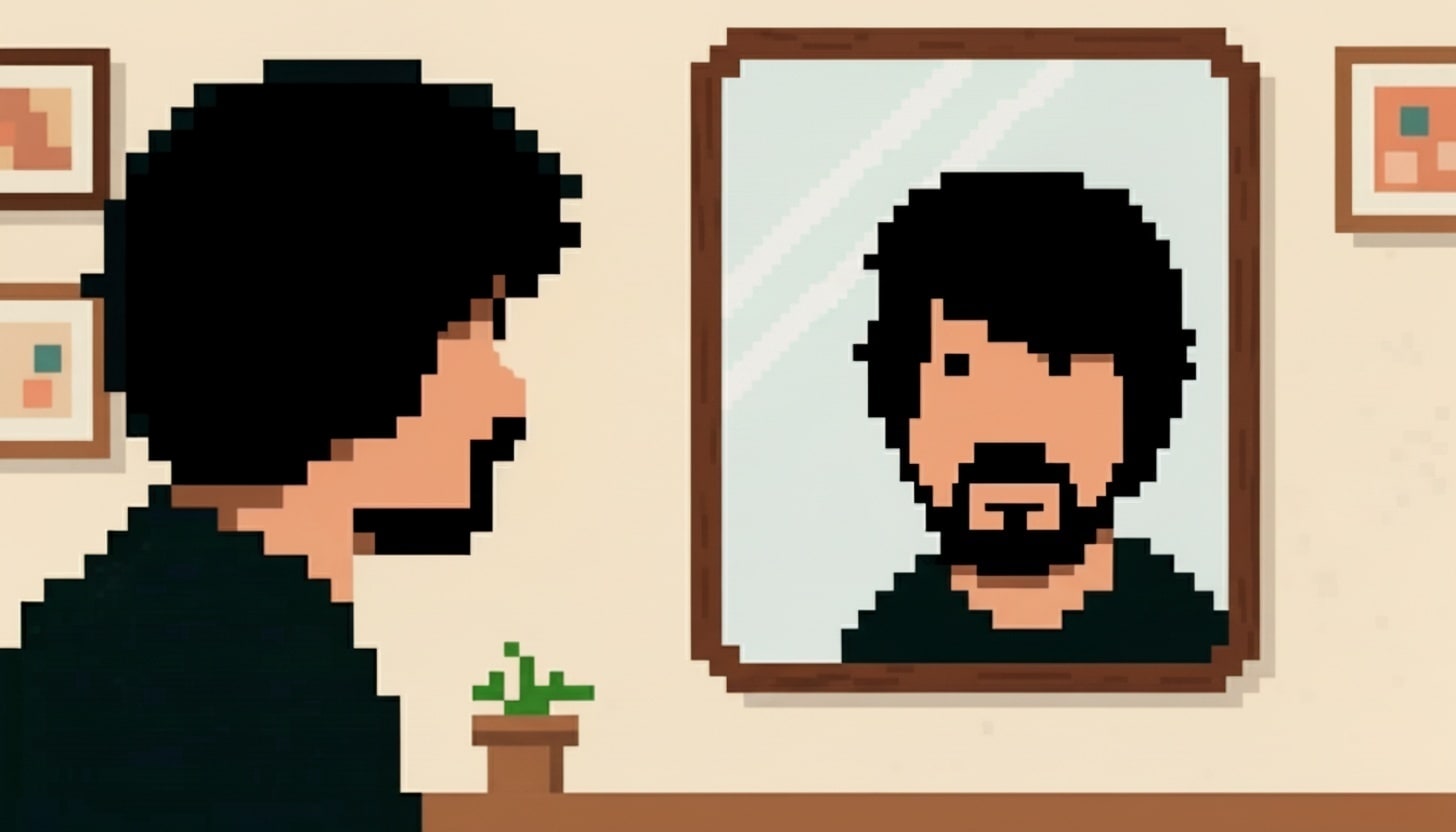The first article was for climbing. The second for leading and growing. This one? This is for a different journey, the main quest so to speak. This one is for life.
No dramatic exit. No bridge-burning manifesto. Just the quiet recognition that the summit I spent decades climbing might not be where I want to plant my flag. After years as an engineering director at one of tech’s giants, I recently made a choice that would have terrified my younger self: I walked away.
A note before we begin: Everything that follows is drawn from my own experience, written from a position of privilege - the financial security to make this choice, the luxury of existential questioning. Your mountain will be different from mine.
If you’re still climbing, you’ll think I quit. But if you’re somewhere feeling that persistent whisper that something’s off - this is for you.
At 25, I traded time for experience.
At 35, I traded time for impact.
At 45, I’m finally understanding that time isn’t something you trade - it’s all you actually have.
Your 40s and 50s are not your 70s. The energy to build something new, to have adventures with your family - these capacities have expiration dates. Why save all your freedom for when your body might have other plans?
The brutal math hit me during an ordinary day as I was planning what to do next at work: If I’m lucky, I have about 20+ productive years left. That’s roughly 10,000 days. But here’s what stopped me cold: My eldest leaves for college next year. My parents are in their 70s. The window for being present in their lives isn’t measured in decades - it’s measured in remaining shared moments.
Just yesterday, it seems, I was teaching my children how to ride a bike. Now we’re discussing college essays. Do I want to spend thousands of those remaining days in meetings about meetings? In reorgs that undo last year’s reorg? Or do I want to be there when my daughter wants to cook a meal together, when my son wants to talk, when my parents want to share stories while they still remember them?
This isn’t about work-life balance. I love working and being productive. But I want my work to be worth my remaining days, and I want the people I love to get more than the exhausted leftovers of my energy.
The equation became clear: Don’t trade money you don’t need for time you don’t have.
I got everything I thought I wanted. An amazing job title. Tech giant logo. Great compensation. Teams that shipped real impact.
Then one day I asked myself: “Imagine you get everything you need - the next promotion, the equity vest, the recognition. Will you be happy then?”
I started to answer yes. Then stopped. No, really - will I? The question echoed for days.
And if the answer is no, then why am I doing what I’m doing?
I had to grapple with this train of thought and face an uncomfortable truth: I was doing what I thought society wanted me to do, not what I should be doing. I’d been climbing a mountain because it was there, because everyone said it was the right mountain, because I’d already invested so much in the ascent. But was this what I actually wanted?
Success is a lousy navigation system for the second half of life.
Success got me here - optimizing for the metrics that mattered to the game I was playing. But somewhere between the fifth reorg and the fourth “4-year plan,” I realized I was navigating by someone else’s stars.
The metrics that matter at 40+ aren’t on any performance review. How many dinners did you enjoy without checking email? When did you last build something because it was interesting, not strategic? What would you create if nobody was measuring?
When you’ve proven you can win the game, the real question becomes: Is this the game you want to keep playing?
Here’s the test: If you won the lottery tomorrow, what would you change? If the answer is “everything,” you’re not living your life - you’re serving a sentence with good benefits.
Thanks for reading What YJ Thinks! This post is public so feel free to share it.
Leaving stable success for uncertainty has a price. Let’s be honest about it.
The golden handcuffs are real - unvested equity, bonuses timed perfectly to keep you one more year. Then there’s the identity validation. “Director at [Tech Giant]” opens doors, validates decades of work. Walking away means explaining to others why you left “such a good job.”
But here’s what nobody tells you: The hardest part isn’t leaving. It’s the messy middle that comes after.
The first few weeks were disorienting. I’d wake up without the muscle memory of checking email or pings, without the gravitational pull of meetings.
That 3 AM panic wondering if you’ve lost your mind? It comes in waves. You cycle through it - doubt, then clarity, then doubt again. Each cycle gets easier, but the first time through felt like freefall. I kept thinking: maybe I had the wrong plan. But I don’t know any other plan. Am I lost?
Right up to the last day I could withdraw from the exit program at work, I wondered if I’d screwed up. My finger hovered over the “cancel” button. The safer route was right there.
But then I’d come back to the foundation: If the ground beneath me was already crumbling - if Sunday evenings filled me with dread, if I was becoming a ghost in my own home - how could I go back, even if it was the default, even if it felt safer?
The truth is, you’re not paying to do nothing. You’re buying back your curiosity. Your Tuesday mornings. Your ability to say “that sounds interesting” without checking Q3 objectives.
More importantly, you’re buying presence. Presence doesn’t mean you’re always with your family - it means when you are, you’re actually there. Time stops slipping by unnoticed and starts being experienced moment by moment. Your daughter tells you about her day and you hear all of it, not just the summary while part of your mind debugs a prod issue.
The tax is temporary. The freedom compounds.
“Engineering Director at...” was my identity for years. Remove it, and who are you?
You spend decades becoming an expert, then realize you’ve become your job title. Your interests narrowed to your industry.
Learning to be a different person is a journey and I’m experimenting with:
Writing to share thoughts freely, not to signal expertise
Rediscovering coding for fun, building without a team or roadmap
Think in years instead of quarters
Measure impact by who I help, not metrics dashboards
Defining myself by curiosity rather than credentials
None of this is figured out. I’m just trying different things to see what fits.
Wandering isn’t the same as being lost. Lost is not knowing where you are. Wandering is exploring without a fixed destination. One is panic, the other is possibility.
The next mountain isn’t something you pick from a catalog. It reveals itself through what you can’t stop thinking about, what makes you angry enough to act, what pulls you forward when you’re too tired to push.
My wandering looks like coffee with others just to learn their stories, building tiny projects that will never scale, reading books unrelated to tech, long conversations with no agenda. Even my morning runs have become a form of wandering - not chasing PRs or optimizing pace, but exploring trails, letting my mind unspool, treating running itself as the project rather than a means to fitness.
And somewhere in this wandering, something unexpected happened. Not a revelation, not a moment of clarity - more like patterns slowly coming into focus. The space I’d created by leaving wasn’t empty. It was revealing what mattered when nothing had to matter, what I reached for when no one was keeping score.
Not all those who wander are lost.
For years, everything had to scale. Could it support millions? Could it 10x? If it couldn’t scale, it wasn’t worth building.
Here’s what I’m learning: The things that matter most are precisely the things that don’t scale.
You can’t scale a conversation with your daughter about her fears. You can’t 10x teaching your son to cook. You can’t platform-ize sitting with your aging parent. One dinner at a time. One bedtime story at a time.
But it’s not just family moments. It’s the morning ritual perfected over years. The vegetable garden on weekends. The three Ukulele chords played badly but joyfully. These small practices - the ones you do because they make you feel alive - might be the most important things you do.
In tech, “doesn’t scale” is a death sentence. In life, it’s the highest praise. Unscalable things resist corruption by external rewards. They remain yours. Pure. Authentic.
What I’m investing in now:
Tiny projects for an audience of one
Elaborate meals that take hours, gone in minutes
Plants that grow at their own pace
Letters to my kids they might read someday
Trail runs where the only metric is how morning light feels
Hobbies I’m mediocre at but love
After decades learning to scale everything, I’m learning to think smaller. To do things that only work one-on-one. To find satisfaction in repetition, in daily practice, in the ritual itself rather than results.
For decades, I optimized for happiness - the next promotion, the achievement high. Brief surges that faded quickly, leaving me reaching for more.
But contentment? That’s different. Deeper.
Happiness is a target; contentment is a state. Happiness says “I’ll feel fulfilled when...” Contentment says “I’m at peace with what is, even as I grow.”
This shift came from learning to simply sit. To notice. To be aware without always becoming something. When you’re present - truly present - time doesn’t slip through your fingers. Each moment becomes distinct, felt, lived. The thousand small things you used to miss while planning tomorrow suddenly come into focus: the way evening light hits the kitchen counter, your son’s particular laugh, the exact taste of morning coffee.
Being aware means time isn’t just passing. It’s being experienced moment by moment.
Contentment comes from:
Being present without proving anything
Building because it’s interesting, not impressive
Conversations without agendas
Watching my kids without simultaneously solving work problems
Running without chasing PRs
Creating without monetizing
Simply sitting, breathing, noticing what is
In that space of simple awareness, you’re not an IC, not a director, not even a VP. You’re just here. And somehow, that’s enough.
Hey present self,
Remember when not knowing felt like failure? When gaps in the resume were something to hide?
This is different. This is the earned uncertainty of someone who’s proven they can figure things out. You’re not behind - you’re off the track entirely. You’re not failing - you’re failing to follow a script that stopped making sense.
The wandering phase isn’t a gap to be explained or a crisis to survive.
To everyone still climbing: respect. The view taught me what I needed to learn.
To everyone who jumped: solidarity. The ground is stranger and more interesting than they told us.
To everyone considering: there’s no perfect time. But if you’re reading this and feeling something stir, that’s your compass pointing toward uncertainty.
I have no idea where I’m going. But I’m certain I’m getting there. And I’m doing it with the people who matter most, while we all still have time.
As for the next note. I don’t know what it will say. I don’t even know when I’ll write it.
That’s precisely the point.
.png)





